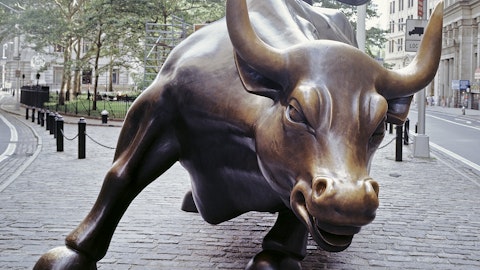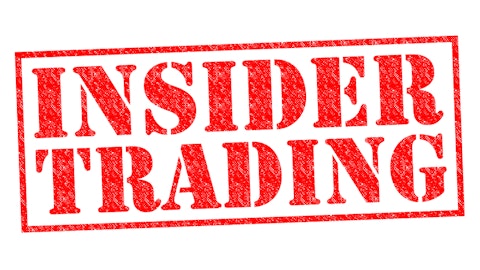While most investors and analysts tend to ignore insider selling completely, insider buying is believed to be extremely informative and crucially important, and rightly so. After all, one can make a laundry list of reasons why corporate insiders may sell shares of their companies, but, presumably, there is only one reason to buy – to make money.
More importantly, past research reveals much more correlation between stock performance and insider buying, as opposed to insider selling. Retail investors closely monitoring insider trading activity should keep in mind that insiders are long-term-oriented investors, so one should not anticipate insider purchases to outperform instantly. However, Insider Monkey does not recommend investors blindly mimic each insider purchase just because research shows insiders’ purchases outperform benchmarks on aggregate. At the end of the day, investors should be able to tell if a company’s stock is undervalued or not on their own, if they want to manage their own money successfully. This essentially means investors need to incorporate insider trading metrics as part of their broader security analysis and selection process. That said, this insider trading article will discuss some noteworthy insider buying reported with the SEC on Thursday.
Academic research has shown that certain insider purchases historically outperformed the market by an average of seven percentage points per year. This effect is more pronounced in small-cap stocks. Another exception is the small-cap stock picks of hedge funds. Our research has shown that imitating the 15 most popular small-cap stocks among hedge funds outperformed the market by nearly a percentage point per month between 1999 and 2012 (read more details here).

Chad McDermott / Shutterstock.com
Struggling Provider of Tax Preparation Services Sees Board Member Boost Stake Consistently
Liberty Tax Inc. (NASDAQ:TAX) has seen a Board member buy shares consistently since late June, with the size of the last purchase exceeding all his purchases of Liberty Tax shares ever. Director Robert M. Howard bought 18,531 Class A shares on Wednesday at prices ranging from $13.00 to $13.15 per share and 1,669 Class A shares on Thursday for $13.25 each. After these relatively sizable purchases, Mr. Howard currently owns 50,000 Class A shares.
The provider of tax preparation services in the United States and Canada has seen the value of its stock plummet by 44% since the beginning of 2016. Liberty Tax Inc. (NASDAQ:TAX)’s total number of customers served in both company-owned and franchise offices during fiscal 2016 that ended April 30 declined by 3.8% year-over-year to 2.16 million. Meanwhile, the company’s systemwide revenue in the U.S. increased by 1.1% year-on-year, mainly due to a 5.1% increase in average net fee per return filed in the nation. Nonetheless, the number of tax returns filed in the U.S. processed fell by 3.9% to 1.83 million.
Liberty Tax shares are currently changing hands at around 7.2-times expected earnings, meaningfully below the forward PE multiple of 16.5 for the S&P 500 Index. Moreover, the company pays out a quarterly dividend of $0.16 per share, which equates to an impressive annual dividend yield of 4.83%. There were a mere four hedge funds monitored by our team invested in Liberty Tax at the end of the March quarter, which amassed 15% of the company’s outstanding common stock. Royce & Associates, founded by Chuck Royce, was the owner of 700,128 shares of Liberty Tax Inc. (NASDAQ:TAX) at the end of March.
Follow Franchise Group Inc. (NASDAQ:FRG FRGAP)
Follow Franchise Group Inc. (NASDAQ:FRG FRGAP)
Receive real-time insider trading and news alerts
The second page of this article will discuss some fresh insider buying registered at two other companies.
Battered Outdoor Sporting Goods Retailer Registers the First Insider Buying of 2016
Sportsman’s Warehouse Holdings Inc. (NASDAQ:SPWH) recently registered the first insider buying of 2016, so let’s take a deeper dive into the company’s performance to find out what might have triggered the recent insider buying. Board member Kent V. Graham snatched up 5,000 shares on Thursday at a price tag of $8.97 each, lifting his overall holding to 23,117 shares. Mr. Graham’s ownership stake includes 6,451 restricted stock units.
The market value of the outdoor sporting goods retailer is down 31% thus far in 2016. Sportsman’s Warehouse Holdings Inc. (NASDAQ:SPWH) currently operates 67 stores in 20 states after opening three new stores so far this year. The company’s net sales for the three months that ended April 30 increased by 9.0% year-over-year to $151.6 million, mainly reflecting sales from the three new store openings. Meanwhile, same-store sales generated from the clothing; optics, electronics and accessories; footwear; and camping departments fell by 14.9%, 8.4%,6.3%, and 1.8% year-over-year. Only the company’s hunting and shooting; and finishing departments had relatively flat same-store sales for the three months that ended April 30.
The shares of the Utah-based purveyor of outdoor sporting goods are priced at around 10.3-times expected earnings, below the forward PE ratio of 17.0 for the consumer discretionary sector. The hedge fund sentiment towards Sportsman’s Warehouse remained flat during the first quarter of 2016, with the number of funds from our system invested in the company remaining unchanged at 13. Jim Simons’ Renaissance Technologies LLC owned 338,400 shares of Sportsman’s Warehouse Holdings Inc. (NASDAQ:SPWH) on March 31.
Follow Sportsman's Warehouse Holdings Inc. (NASDAQ:SPWH)
Follow Sportsman's Warehouse Holdings Inc. (NASDAQ:SPWH)
Receive real-time insider trading and news alerts
Battered Pharmaceutical Company Registers Insider Buying
Esperion Therapeutics Inc. (NASDAQ:ESPR) saw a member of its boardroom buy a new stake earlier this week. Mark E. McGovern, appointed to the company’s Board of Directors in mid-February 2014, purchased a new stake of 600 shares on Tuesday for $10.00 each, as well as an additional block of 4,400 shares on the following day at exactly the same price. Although the size of the recent purchase is not overly significant, the timing of the acquisition may offer some useful insights about the near-term future of the company.
The pharmaceutical company focused on developing low-density lipoprotein cholesterol (LDL-C) lowering therapies has seen its market capitalization plunge by 88% in the past year, so Dr. McGovern’s recent purchase may point to an attractive entry point for investors. The share price of Esperion Therapeutics Inc. (NASDAQ:ESPR)’s stock plunged in late August on the news that the FDA encouraged the company to initiate a cardiovascular outcomes trial for its lead product candidate called bempedoic acid. The primary issue is that the company’s experimental drug may not win FDA approval based exclusively on its ability to lower bad cholesterol, after management said in August of 2015 that lowering LDL-C would be enough for approval. As Esperion’s bempedoic acid could require a completed cardiovascular outcomes trial before approval, investors are worried that it could six more years for this experimental drug to reach the U.S. market.
There were 10 asset managers followed by Insider Monkey with equity investments in the pharmaceutical company at the end of March, as compared to 12 registered at the end of December. Those 10 managers hoarded up roughly 29% of the company’s total number of outstanding shares. Dennis Purcell’s Aisling Capital reported owning 1.64 million shares of Esperion Therapeutics Inc. (NASDAQ:ESPR) in its latest 13F.
Follow Esperion Therapeutics Inc. (NASDAQ:ESPR)
Follow Esperion Therapeutics Inc. (NASDAQ:ESPR)
Receive real-time insider trading and news alerts
Disclosure: None





